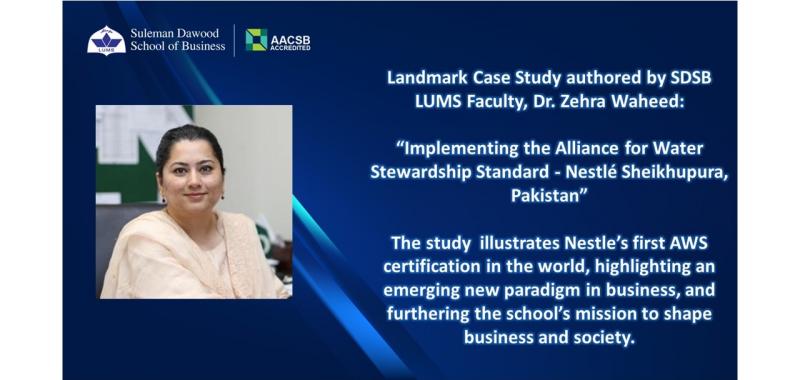
Following the accreditation of Suleman Dawood School of Business in 2019 by the Association to Advance Collegiate Schools of Business (AACSB International), several key initiatives have been mobilised. SDSB has revised its strategy to focus on the development of ideas and people to shape business and society. The Centre for Business and Society at SDSB serves as the interface between academia and society, with a firm and explicit social commitment.
Industry in developing countries has to choose between socially and environmentally sound, ethical practices; versus the obvious, cost-effective ones. "Throughout my academic career I have tried to look into various facets of this same phenomenon: from the lens of better solid waste management practice to that of responsible water usage in industry to the adoption of green buildings in Pakistan and also plastics management and recycling", says SDSB-LUMS Faculty and Director Centre for Business and Society- LUMS, Dr. Zehra Waheed.
Dr. Zehra Waheed recently authored a landmark case study, "Implementing the Alliance for Water Stewardship Standard - Nestlé Sheikhupura, Pakistan", co-authored with Sohaib Waseem (WWF Pakistan) and Maheen Malik (AWS Pakistan). The study illustrated an emerging new paradigm in business, one driven by a water standard. In an operating environment such as the one in Pakistan, where there is little or no policy or regulation-driven change, responsible practice from industry tends to be driven by the need for cost-effectiveness and improved management of reputational and environmental risk.
This case study takes readers through the process of adoption of a global standard that improves awareness and management of issues related to water stress, and in turn is pivotal in developing a wider understanding of where drivers of change lie, in addition to presenting proven adoption processes within the specific Pakistani context.
The case study is available through the AWS website, here
In recognition of the unique contributions of this case study, a webinar, "Spotlight on Pakistan: Learning from Nestlé's first AWS certification in the world", will be organized on Thursday, September 3rd, 2020 from 3:00 p.m. to 4:00 p.m. (Pakistan Standard Time). Register for the webinar here
The speakers will include:
- Nusrat Gill, Chief of Environment & Climate Change, Planning & Development Board, Government of Punjab, Pakistan
- Muaaz Aqeel, Water Expert & Senior Project Engineer, Sheikhupura Factory, Nestlé Pakistan
- Dr. Zehra Waheed, Assistant Professor of Operations & Project, Management at Suleman Dawood, School of Business, Lahore University of Management Sciences (LUMS),
- Maheen Malik, Country Coordinator, AWS Pakistan
- Adrian Sym, CEO, AWS
The Alliance for Water Stewardship (AWS) is a global collaboration comprising businesses, NGOs and the public sector around the world. AWS members contribute to the sustainability of local water-resources through adoption and promotion of a universal framework for the sustainable use of water. The International Water Stewardship Standard (or AWS Standard) drives, recognizes and rewards good water stewardship performance. It also helps improve performance in five key areas:
- Improved water governance
- Sustainable water balance
- Good water quality
- Healthy status of important water-related areas
- Access to water, sanitation and hygiene (WASH) for all








